What is OnlineFix64.dll?
When users confront the “error code 126: failed to load OnlineFix64.dll from the list,” it indicates that a particular application or game is unable to load the OnlineFix64.dll file. Occasionally, users may encounter a related error message stating, “The code execution cannot proceed because OnlineFix64.DLL was not found.
Know that OnlineFix64.dll is a harmful Trojan Horse that can lead to various issues for your computer. It has the capability to take your information, corrupt your files, and more without your consent. To shield yourself from this hazard, read this article to gain more knowledge about the threat how to completely eliminate it from your computer system.
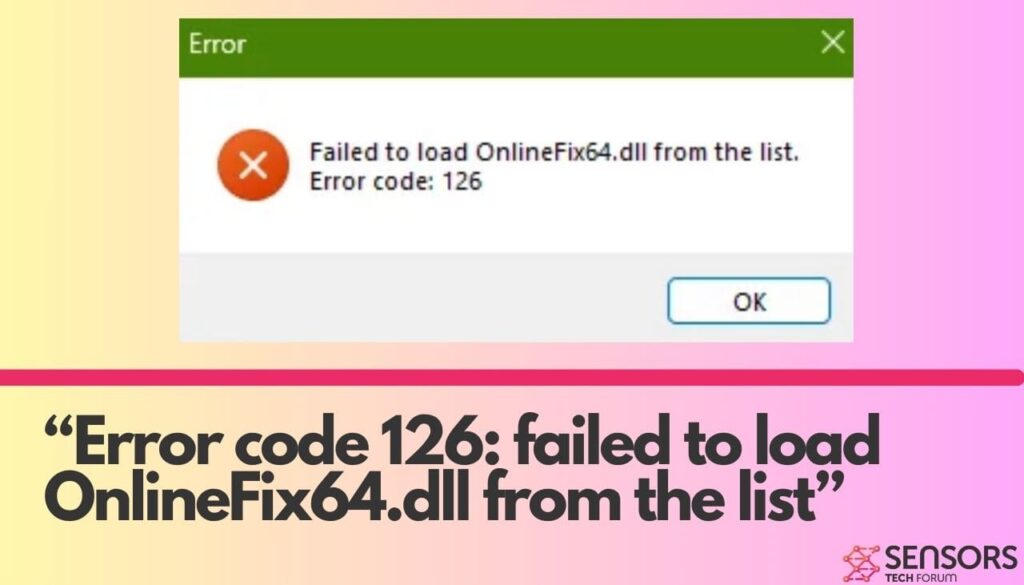
OnlineFix64.dll Summary
| Name | OnlineFix64.dll |
| Type | Trojan Horse |
| Removal Time | Approximately 15 minutes |
| Removal Tool |
See If Your Mac Has Been Affected by OnlineFix64.dll
Download
Malware Removal Tool
|
OnlineFix64.dll Trojan – Why Do I See It?
OnlineFix64.dll is a harmful software that could have been installed on your computer without your consent. It has been crafted to use your computer’s resources to generate and move cryptocurrency to the attacker’s wallet. It is essential to remove this virus immediately to prevent further harm to your system.
OnlineFix64.dll Trojan – How Did I Get It?
If someone sends you an email with a file attached that appears important, such as an invoice or e-ticket, do not download or open it as it could put your computer at risk of a malware infection. Enabling the contents of the document may activate malicious macros. The file types that could be sent include:
- A flight ticket.
- Paycheck document.
- Payment due type of document.
- An e-receipt or invoice.
OnlineFix64.dll Virus – What Does It Do?
If OnlineFix64.dll gains access to your computer, it can execute various malicious activities such as running a Bitcoin Miner virus. In addition, it can download payload files and generate mutexes without your knowledge. This can be added in the form of files in particular Windows directories.
- %Local%
- %AppData%
- %Temp%
- %Windows%
The file may also compromise the following Windows Registries:
HKEY_LOCAL_MACHINE\Software\Microsoft\Windows\CurrentVersion\Run
HKEY_LOCAL_MACHINE\Software\Microsoft\Windows\CurrentVersion\RunOnce
HKEY_CURRENT_USER\Software\Microsoft\Windows\CurrentVersion\Run
HKEY_CURRENT_USER\Software\Microsoft\Windows\CurrentVersion\RunOnce
OnlineFix64.dll – Is It a Virus?
Yes, OnlineFix64.dll Trojan is a type of virus that can cause harm to your computer by using its resources to generate cryptocurrency without your permission or knowledge. It can cause a variety of problems, such as slowing down the system, corrupting data, and stealing sensitive information. Also, it can be hard to detect and remove, making it a dangerous threat to your system.
- Download other viruses.
- Update its miners, control them.
- Take screenshots.
- Steal files.
- Log the keystrokes you type.
- Obtain data from your PC.
- Control your microphone and audio.
What to Do If I See OnlineFix64.dll?
If you think your computer has been compromised by OnlineFix64.dll, the best course of action is to scan it using a professional anti-malware software. This specialized program is designed to detect and remove the virus, as well as protect your computer in the future. In addition, a removal guide has been created to assist with manual and automatic deletion of the virus.
Remove OnlineFix64.dll Virus from Your Computer
The best way to get rid of OnlineFix64.dll from your computer is to use a professional anti-malware software to scan and automatically remove the virus. This type of program is designed to thoroughly check for malicious objects and clean them from your device, as well as providing future protection.
Preparation before removing OnlineFix64.dll.
Before starting the actual removal process, we recommend that you do the following preparation steps.
- Make sure you have these instructions always open and in front of your eyes.
- Do a backup of all of your files, even if they could be damaged. You should back up your data with a cloud backup solution and insure your files against any type of loss, even from the most severe threats.
- Be patient as this could take a while.
- Scan for Malware
- Fix Registries
- Remove Virus Files
Step 1: Scan for OnlineFix64.dll with SpyHunter Anti-Malware Tool
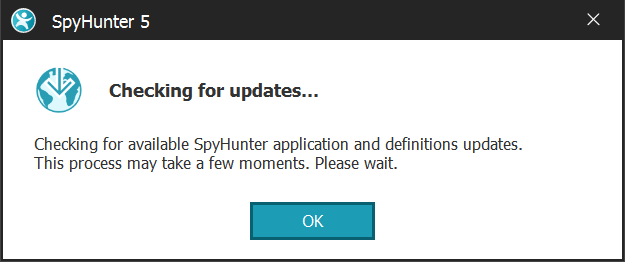
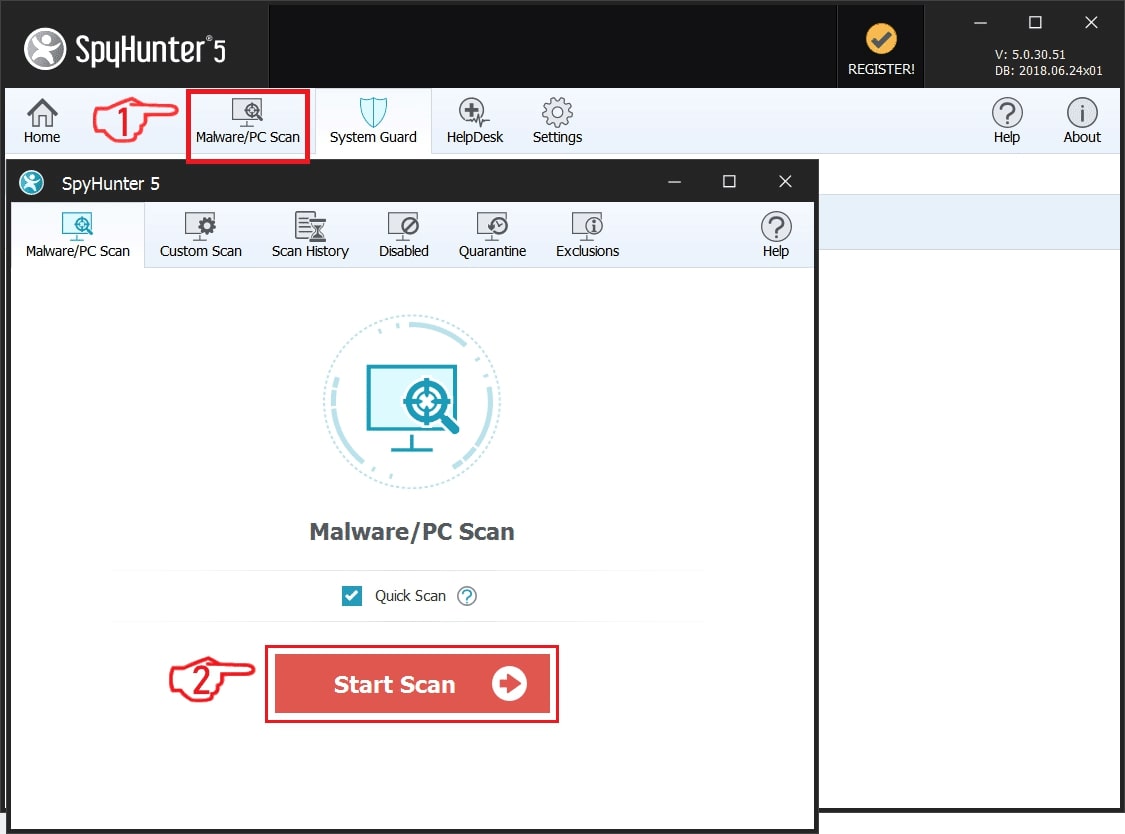
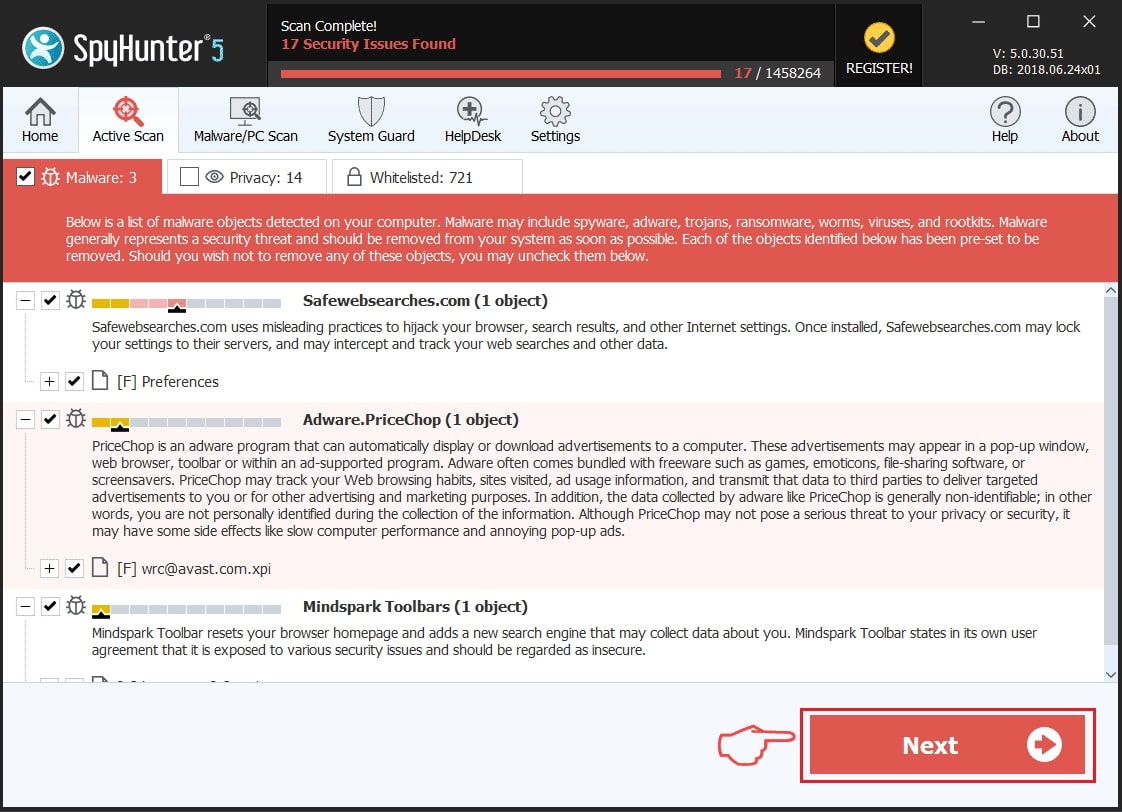
Step 2: Clean any registries, created by OnlineFix64.dll on your computer.
The usually targeted registries of Windows machines are the following:
- HKEY_LOCAL_MACHINE\Software\Microsoft\Windows\CurrentVersion\Run
- HKEY_CURRENT_USER\Software\Microsoft\Windows\CurrentVersion\Run
- HKEY_LOCAL_MACHINE\Software\Microsoft\Windows\CurrentVersion\RunOnce
- HKEY_CURRENT_USER\Software\Microsoft\Windows\CurrentVersion\RunOnce
You can access them by opening the Windows registry editor and deleting any values, created by OnlineFix64.dll there. This can happen by following the steps underneath:
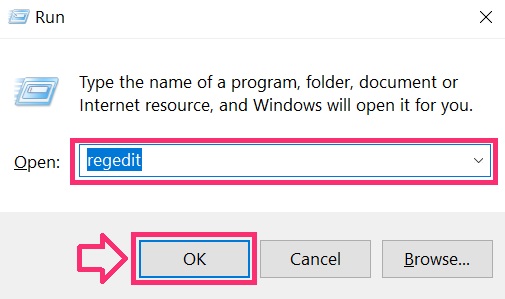

 Tip: To find a virus-created value, you can right-click on it and click "Modify" to see which file it is set to run. If this is the virus file location, remove the value.
Tip: To find a virus-created value, you can right-click on it and click "Modify" to see which file it is set to run. If this is the virus file location, remove the value.Step 3: Find virus files created by OnlineFix64.dll on your PC.
1.For Windows 8, 8.1 and 10.
For Newer Windows Operating Systems
1: On your keyboard press + R and write explorer.exe in the Run text box and then click on the Ok button.
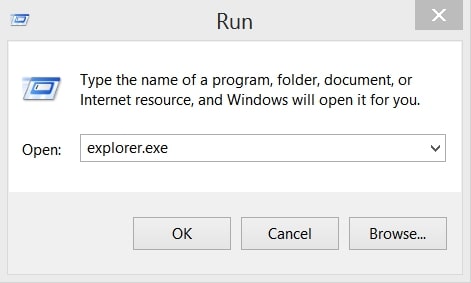
2: Click on your PC from the quick access bar. This is usually an icon with a monitor and its name is either “My Computer”, “My PC” or “This PC” or whatever you have named it.
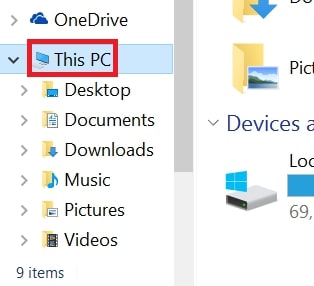
3: Navigate to the search box in the top-right of your PC's screen and type “fileextension:” and after which type the file extension. If you are looking for malicious executables, an example may be "fileextension:exe". After doing that, leave a space and type the file name you believe the malware has created. Here is how it may appear if your file has been found:
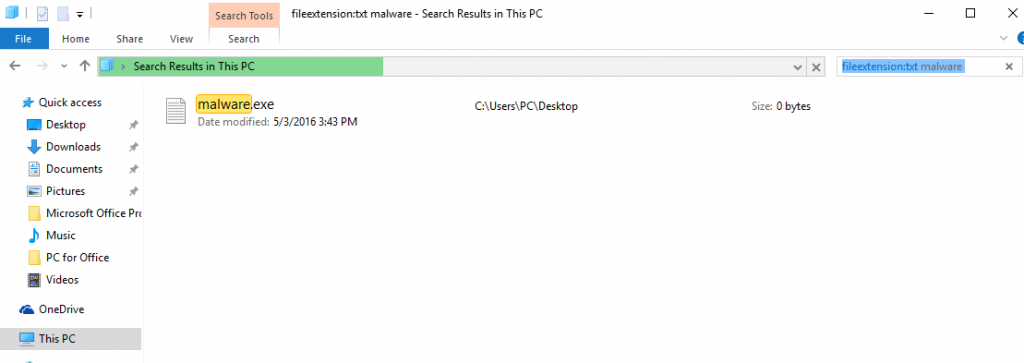
N.B. We recommend to wait for the green loading bar in the navigation box to fill up in case the PC is looking for the file and hasn't found it yet.
2.For Windows XP, Vista, and 7.
For Older Windows Operating Systems
In older Windows OS's the conventional approach should be the effective one:
1: Click on the Start Menu icon (usually on your bottom-left) and then choose the Search preference.
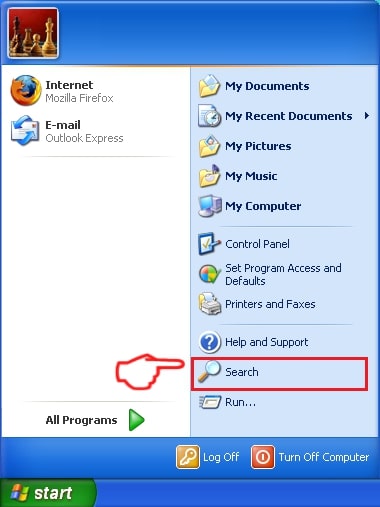
2: After the search window appears, choose More Advanced Options from the search assistant box. Another way is by clicking on All Files and Folders.
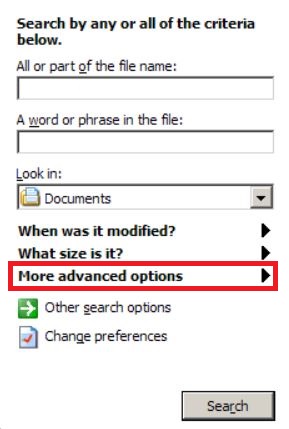
3: After that type the name of the file you are looking for and click on the Search button. This might take some time after which results will appear. If you have found the malicious file, you may copy or open its location by right-clicking on it.
Now you should be able to discover any file on Windows as long as it is on your hard drive and is not concealed via special software.
OnlineFix64.dll FAQ
What Does OnlineFix64.dll Trojan Do?
The OnlineFix64.dll Trojan is a malicious computer program designed to disrupt, damage, or gain unauthorized access to a computer system. It can be used to steal sensitive data, gain control over a system, or launch other malicious activities.
Can Trojans Steal Passwords?
Yes, Trojans, like OnlineFix64.dll, can steal passwords. These malicious programs are designed to gain access to a user's computer, spy on victims and steal sensitive information such as banking details and passwords.
Can OnlineFix64.dll Trojan Hide Itself?
Yes, it can. A Trojan can use various techniques to mask itself, including rootkits, encryption, and obfuscation, to hide from security scanners and evade detection.
Can a Trojan be Removed by Factory Reset?
Yes, a Trojan can be removed by factory resetting your device. This is because it will restore the device to its original state, eliminating any malicious software that may have been installed. Bear in mind that there are more sophisticated Trojans that leave backdoors and reinfect even after a factory reset.
Can OnlineFix64.dll Trojan Infect WiFi?
Yes, it is possible for a Trojan to infect WiFi networks. When a user connects to the infected network, the Trojan can spread to other connected devices and can access sensitive information on the network.
Can Trojans Be Deleted?
Yes, Trojans can be deleted. This is typically done by running a powerful anti-virus or anti-malware program that is designed to detect and remove malicious files. In some cases, manual deletion of the Trojan may also be necessary.
Can Trojans Steal Files?
Yes, Trojans can steal files if they are installed on a computer. This is done by allowing the malware author or user to gain access to the computer and then steal the files stored on it.
Which Anti-Malware Can Remove Trojans?
Anti-malware programs such as SpyHunter are capable of scanning for and removing Trojans from your computer. It is important to keep your anti-malware up to date and regularly scan your system for any malicious software.
Can Trojans Infect USB?
Yes, Trojans can infect USB devices. USB Trojans typically spread through malicious files downloaded from the internet or shared via email, allowing the hacker to gain access to a user's confidential data.
About the OnlineFix64.dll Research
The content we publish on SensorsTechForum.com, this OnlineFix64.dll how-to removal guide included, is the outcome of extensive research, hard work and our team’s devotion to help you remove the specific trojan problem.
How did we conduct the research on OnlineFix64.dll?
Please note that our research is based on an independent investigation. We are in contact with independent security researchers, thanks to which we receive daily updates on the latest malware definitions, including the various types of trojans (backdoor, downloader, infostealer, ransom, etc.)
Furthermore, the research behind the OnlineFix64.dll threat is backed with VirusTotal.
To better understand the threat posed by trojans, please refer to the following articles which provide knowledgeable details.


